Sewing enthusiasts often find solace in the rhythmic hum of their trusted Singer sewing machines, creating beautiful stitches and intricate designs. Yet, amid the creativity, a crucial question lingers – “Do I need to oil my Singer sewing machine?”
Understanding the maintenance requirements of your sewing companion is vital for ensuring its longevity and optimal performance. In this guide, we delve into the intricacies of sewing machine care, focusing on the iconic Singer brand.
From the importance of lubrication to the signs that indicate your machine is thirsty for oil, let’s navigate the world of sewing machine maintenance together.
Whether you’re a seasoned seamstress or a novice exploring the art of stitching, this exploration will shed light on the essential practice of oiling your Singer sewing machine. Let’s unravel the threads of knowledge and keep your sewing journey smooth and seamless.
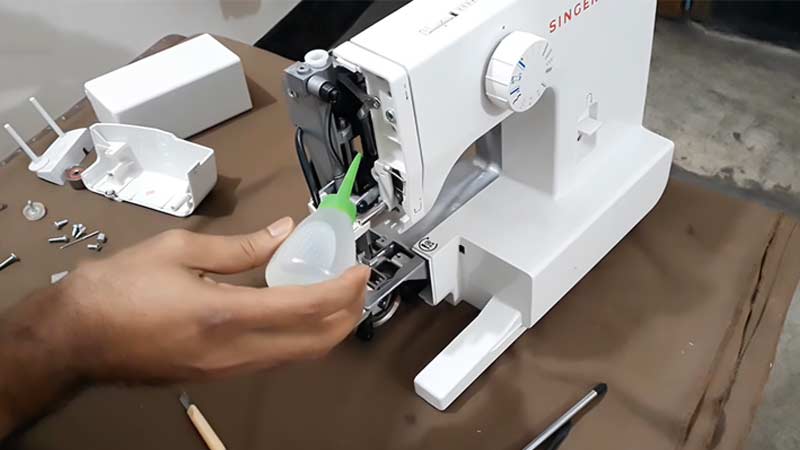
Do I Need to Oil My Singer Sewing Machine?
Here, we will explore why you need to oil a Singer sewing machine, signs that indicate your machine needs lubrication, and step-by-step instructions on how to oil a Singer sewing machine.
Understanding the Need for an Oiling Singer Sewing Machine
Your Singer sewing machine, like any mechanical device, requires proper maintenance to function at its best. Oiling is a fundamental aspect of this maintenance routine.
The moving parts within the machine, such as the hook, gears, and needle bar, benefit from lubrication to reduce friction and wear. Regular oiling not only prolongs the life of these components but also ensures smooth and precise stitching.
Benefits of Oiling a Singer Sewing Machine
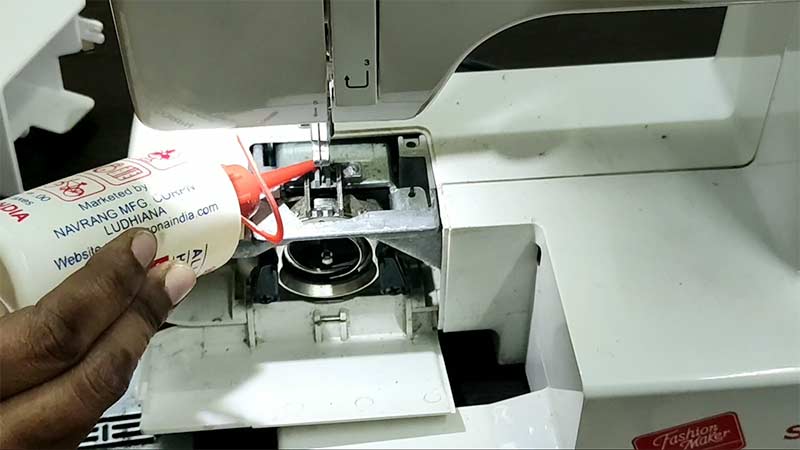
Before we get into how to lubricate the Singer sewing machine, let’s find out whether oiling the sewing machine Singer is necessary.
Oiling your Singer sewing machine is a fundamental aspect of maintenance that reaps a multitude of benefits, ensuring the longevity and optimal performance of your trusted crafting companion.
Reduced Friction for Smooth Operation
Proper lubrication significantly reduces friction between the moving parts of your sewing machine. This smooth operation not only enhances the sewing experience but also prevents unnecessary strain on the machine’s components.
Extended Lifespan through Wear Prevention
Regular oiling acts as a protective measure against wear and tear on critical components such as the hook, gears, and needle bar. By minimizing friction-induced damage, you effectively extend the overall lifespan of your sewing machine.
Improved Performance and Precision with Singer Sewing Machine Oil
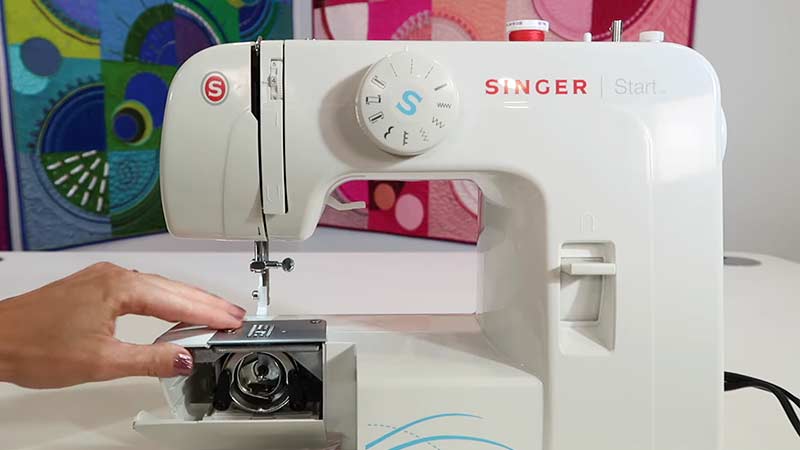
A well-lubricated sewing machine operates with precision, resulting in consistent and high-quality stitches. The improved performance ensures that your sewing projects reflect the meticulous craftsmanship that Singer machines are known for.
Minimized Noise for a Quieter Environment
Properly lubricated parts contribute to a quieter sewing environment. The reduction in noise levels enhances the overall sewing experience, providing a more enjoyable and focused crafting session.
Prevention of Rust and Corrosion
Lubrication forms a protective barrier on metal components, safeguarding them from rust and corrosion. This is especially crucial for maintaining the integrity of your machine, particularly if it’s exposed to varying environmental conditions.
Enhanced Stitch Quality for Professional Results
Oiling plays a pivotal role in maintaining the integrity of the sewing process, contributing to the production of high-quality stitches. This is essential for achieving professional and polished results in your sewing projects.
Oil Singer Sewing Machine for Comfort and Efficiency
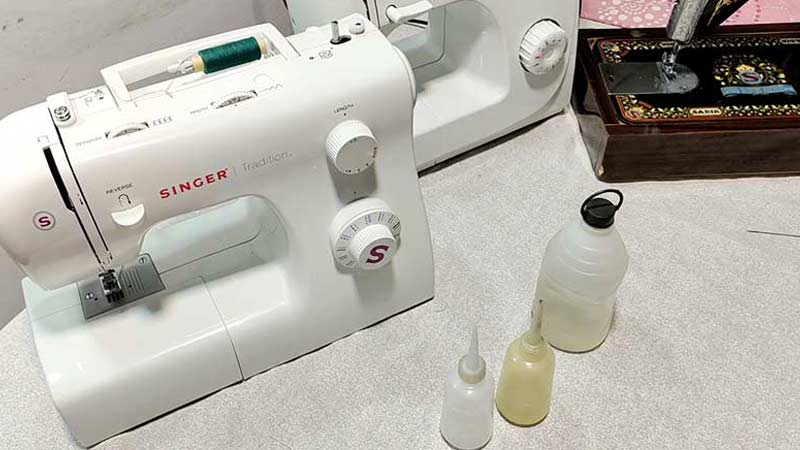
Smoothly running components make sewing more comfortable and less strenuous. A well-maintained machine allows for effortless control, contributing to an efficient and enjoyable sewing experience.
Prevention of Breakdowns for Reliable Operation
Regular oiling serves as a proactive measure against unexpected breakdowns. By keeping your sewing machine well-maintained, you ensure reliable and consistent operation, reducing the likelihood of interruptions during your creative endeavors.
Signs Your Singer Machine Needs Oil
Recognizing the signs that your Singer sewing machine needs oiling is essential for maintaining its optimal performance and preventing potential issues. Here, we delve into various indicators that suggest your machine is thirsty for lubrication.
Unusual Noises
One of the earliest and most noticeable signs that your Singer machine requires oiling is the emergence of unusual noises during operation.
If you start hearing squeaks, grinding sounds, or any other atypical sounds, it’s a clear indication that the moving parts are experiencing increased friction. Regular oiling can significantly reduce these noises, ensuring a quieter and smoother sewing experience.
Visible Wear on Parts
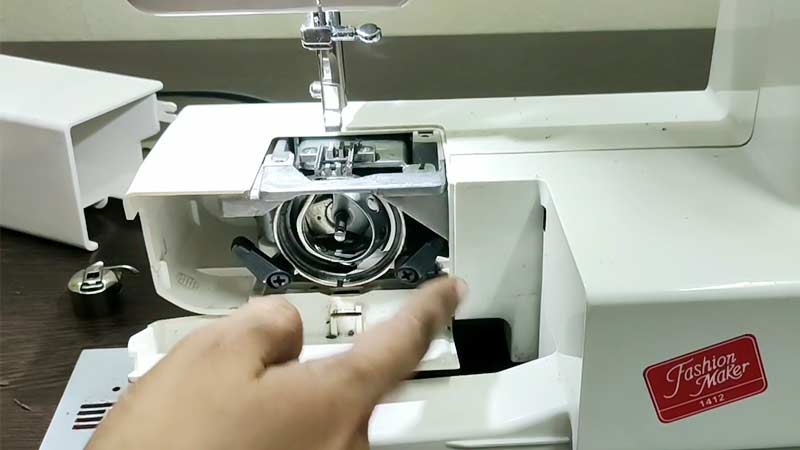
Examine the visible moving parts of your sewing machine, such as the hook and gears. If you observe signs of wear, such as scratches, rough surfaces, or visible metal-on-metal contact, it’s an indication that these parts are not adequately lubricated.
Addressing this promptly through oiling can prevent further damage and preserve the longevity of these crucial components.
Difficulty in Thread Engagement
Problems with thread engagement, where the thread doesn’t smoothly interact with the bobbin or shuttle, can be a symptom of insufficient lubrication. Oiling these specific areas ensures that the thread moves seamlessly, reducing the likelihood of thread-related issues during sewing.
Tension Problems
Inadequate lubrication can also impact the tension settings on your sewing machine. If you find that adjusting the tension no longer produces the desired results and your stitches are consistently too tight or too loose, it’s time to inspect and oil the relevant parts.
Frequent Jamming or Needle Breakage
Frequent jams or needle breakage may be a consequence of insufficient lubrication. When the internal components don’t move smoothly, it can lead to disruptions in the sewing process. Regular oiling helps prevent jams and ensures that the needle moves effortlessly through the fabric.
Visible Dust and Lint Accumulation
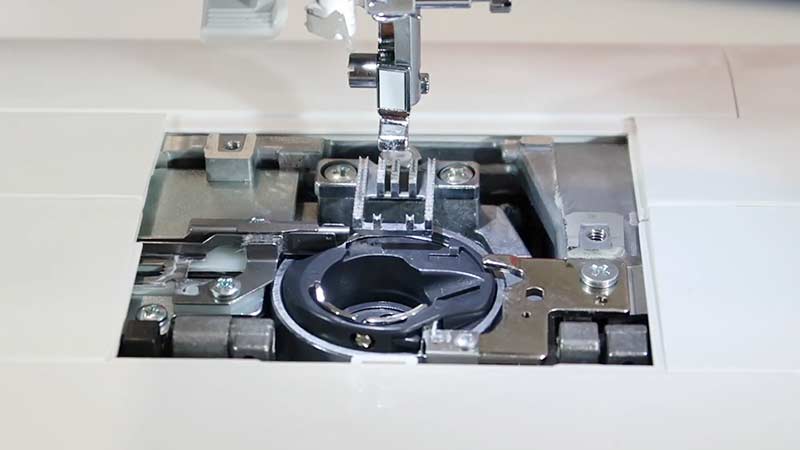
Dust and lint can accumulate over time, hindering the proper functioning of your sewing machine.
If you notice a visible buildup of debris, especially around moving parts, it’s an indication that your machine needs a thorough cleaning and oiling. Clearing away debris ensures that the oil reaches the critical points and does its job effectively.
Machine Slowing Down
A noticeable decrease in the overall speed of your sewing machine is a sign that internal components are facing increased resistance.
Oiling these components rejuvenates their movement, restoring the machine’s speed to its optimal level and maintaining a consistent stitching pace.
How to Oil Singer Sewing Machine?
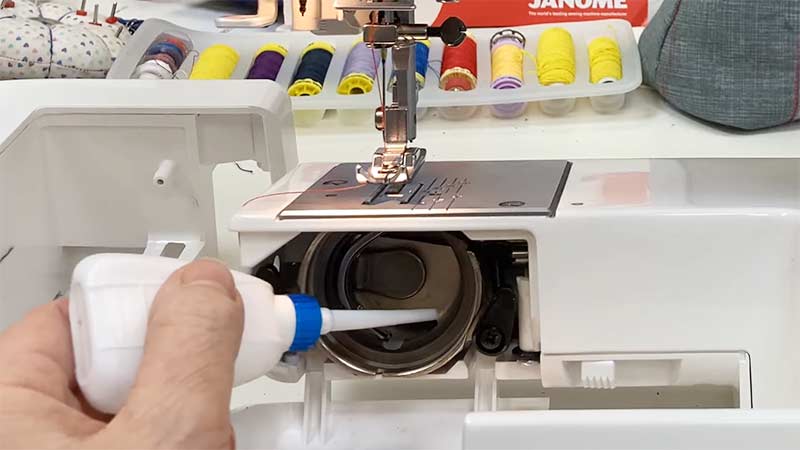
Oiling your Singer sewing machine is a simple yet vital aspect of its maintenance. Here’s a step-by-step guide on how to oil your Singer sewing machine:
Refer to Your Manual
Begin by consulting your Singer sewing machine manual. It provides specific instructions on the type of oil to use and the locations that require lubrication.
Different models may have varying oiling points, so always follow the manufacturer’s guidelines. Ensure you have the necessary supplies.
Prepare Your Workspace
Place your sewing machine on a stable surface, and turn it off. Unplug the machine to ensure safety during the oiling process.
Use the small brush to remove any dust or lint from the exterior and interior of the machine. Cleaning ensures that the oil reaches the intended parts without interference.
Identify Lubrication Points
Refer to your manual to locate the specific points that require oiling. Common areas include the hook, shuttle race, and other moving parts. Some modern machines may have self-lubricating parts, so check your manual for guidance.
Apply the Oil
Use a small amount of sewing machine oil, typically a single drop, at each designated lubrication point. Precision is key; too much oil can attract dust and lint, causing more harm than good. Apply the oil directly to the moving parts as instructed in your manual.
Distribute the Oil
Rotate the handwheel or run the machine without fabric for a few minutes. This helps distribute the oil evenly across the moving components, ensuring thorough lubrication.
Wipe Excess Oil
Use a lint-free cloth to wipe away any excess oil. This step is crucial to prevent oil transfer onto your fabric during sewing. A clean, dry cloth helps maintain the cleanliness of your machine.
Run a Test Stitch
Sew a few test stitches on scrap fabric to ensure the machine is running smoothly. This not only helps in distributing oil further but also removes any excess oil from the internal parts.
Establish a Maintenance Schedule
Create a routine for oiling your Singer sewing machine. Depending on your usage, a general guideline is to oil it every 8 to 10 hours of sewing. Consistency in maintenance ensures the prolonged health and performance of your machine.
Additional Tips
Use only high-quality sewing machine oil recommended by Singer to ensure optimal performance. If your machine has not been used for an extended period, it’s advisable to oil it before starting a new project.
FAQs
Why is it necessary to oil my Singer sewing machine?
Regular oiling is essential to reduce friction between moving parts, preventing wear and tear, ensuring smooth operation, and extending the overall lifespan of your Singer sewing machine.
How often should I oil my Singer sewing machine?
A general guideline is to oil your machine every 8 to 10 hours of sewing. However, the frequency may vary based on usage. Check your machine’s manual for specific recommendations.
Can I use any oil for my Singer sewing machine?
It’s crucial to use a high-quality sewing machine oil recommended by Singer. Using the wrong type of oil may damage your machine or affect its performance.
What are the signs that my Singer sewing machine needs oiling?
Signs include unusual noises during operation, stiff movement or difficulty turning the handwheel, uneven stitches, increased resistance, visible wear on parts, difficulty in thread engagement, tension problems, frequent jams, and a visible slowdown in the machine’s speed.
How do I oil my Singer sewing machine properly?
Refer to your machine’s manual for specific instructions. Generally, clean the machine, identify lubrication points, apply a small amount of oil at each point, distribute the oil by running the machine, wipe away excess oil, run a test stitch, and establish a regular maintenance schedule.
Conclusion
In the realm of sewing, preserving the lifeblood of your craft – the Singer sewing machine – requires attention and care.
As we conclude our exploration into the question, “Do I need to oil my Singer sewing machine?” the resounding answer is yes.
Regularly lubricating the machine is not just a maintenance chore; it’s a commitment to the longevity of your creative companion.
From preventing wear and tear to maintaining smooth, precise stitches, oiling proves indispensable.
Remember, a well-cared-for sewing machine is a reliable partner in your crafting endeavors. In nurturing your Singer machine, oiling becomes the timeless melody of longevity.
So, embrace the simple yet powerful act of oiling, and your Singer machine will continue to stitch stories and memories for years to come.
Let this commitment to maintenance be the thread that weaves a seamless tapestry of creativity in your sewing journey.
Leave a Reply